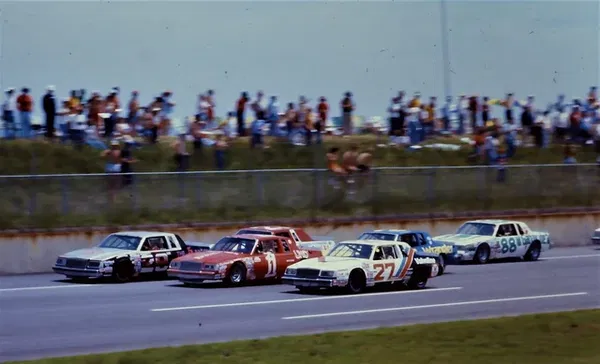

1988 Daytona 500: It was Valentine’s Day, but hardly anyone got any love on the track, especially Richard Petty. Already a seven-time Cup Series champion by then, the 2.5-mile speedway was supposed to be The King‘s hunting ground. Instead, he ended up being hunted. On Lap 106, Turn 4, Petty went airborne while traveling at over 180 mph, rear-end first, hit the outside wall and flipped over a dozen times before settling on all fours. Debris and two of the tires flew in all directions and spectators fled to escape, as the racer limped away from the wreck. Expectedly, it made national headlines.
But there was one other name who earned nationwide recognition that day: Phil Barkdoll, who had nudged Petty’s car, leading to the incident. However, it wasn’t just his role in the crash, but also his journey to the big stage that intrigued fans. Coming from humble beginnings, the independent driver turned out to be the epitome of grassroots racing. He was a small-town racer from Iowa who rolled into NASCAR with a $100 stock car bought in 1981 and a dream bigger than his bank account. Legend has it he strolled into Midwestern racing promoter Keith Knaack’s office that same year after a stint in the Iowa stock car racing scene and declared, “I think I’m ready for Daytona.”
Most would’ve laughed him off. But, Barkdoll’s quiet grit convinced Knaack. Contributing $2,500 out of pocket and $7,500 in borrowed money, the duo bought a 1979 Dodge. “Everyone pitched in and helped us when we needed it. The only thing anyone got for helping out was their name on the car,” the racer had recalled later. The gamble paid off. Starting 35th in an ARCA event at Daytona, Barkdoll finished 11th that day. It also launched what was a memorable career spanning 15 years that included racing at only Talladega and Daytona. Unfortunately, these are just legends now. The protagonist is no more. On September 2, Phil Barkdoll passed away peacefully at his home in Vinton, Iowa, with his family by his side. He was 87.
ADVERTISEMENT
Article continues below this ad
As per Phillips Funeral Homes, funeral services will be held on September 8, followed by a private family burial. “In lieu of flowers, memorials may be directed to the Stead Family Children’s Hospital at the University of Iowa,” the obituary also mentioned. This will also be followed by a celebration luncheon at “Phil’s favorite spot—his beloved cabin—” at 1 PM that same day. Notably, in his NASCAR Cup Series career, the veteran competed in 38 races between 1984 and 1997. His best finish came in 1989 when he finished P15 at both Coke Zero Sugar 400 and YellaWood 500.
Barkdoll leaves behind his wife, Linda, brothers Allan, Don and Sojka, his eight children, 29 grandchildren and 16-great grandchildren. “Phil Barkdoll lived life wide open, with a full tank and a heart overflowing. His legacy is one of love, laughter, and unforgettable memories and his story will be told for generations,” the Funeral Home’s website aptly noted. Many in the NASCAR community also agree.
ADVERTISEMENT
Article continues below this ad
NASCAR community mourns for Barkdoll
The outpouring of love for Phil Barkdoll has been heartfelt, with the NASCAR community rallying around his memory. Spotter Freddie Kraft took to X to share some heartfelt thoughts, writing, “RIP Phil Barkdoll. I never got a chance to meet Phil, but his son Steve is simply one of the kindest, generous, and most genuine people I’ve ever met. We’re thinking of you buddy.” NASCAR journalist Bob Pockrass also chimed in with some beautiful revelations on the social media platform: “Sad to see this. Phil Barkdoll always was fun to talk to in the Daytona garage when he was attempting to make the Daytona 500. RIP.”
RIP Phil Barkdoll.
I never got a chance to meet Phil, but his son Steve is simply one of the kindest, generous, and most genuine people I’ve ever met. We’re thinking of you buddy. https://t.co/md8OYbHgxl
— Freddie Kraft (@FreddieKraft) September 4, 2025
ADVERTISEMENT
Article continues below this ad
Fans also echoed that sentiment, celebrating Barkdoll’s unique place in the sport. One wrote, “He was one of a kind that’s for sure… keep the Barkdoll family in your thoughts and prayers as Steve has a brother (Jeff) that’s also battling cancer.” Another added, “RIP. Although I only got to see him compete a few times, I always anticipated the plate races and his qualifying attempts. A legend for folks in and around Iowa. Long live Hawkeye Racing News.” Barkdoll’s legacy stretched beyond his own races. He fielded cars for drivers like Ken Bouchard, Mike Wallace, and Jim Sauter, keeping their dreams alive. His most selfless moment came in 1997 at Daytona, when he qualified for the 500 but sold his spot to Joe Nemechek, giving “Front Row Joe” a shot at NASCAR’s biggest stage.
What’s your perspective on:
Is the spirit of underdogs like Phil Barkdoll what truly defines NASCAR's legacy?
Have an interesting take?
For a guy who scratched and clawed to make the field himself, that act of generosity spoke volumes about his character, humble, selfless, and all about lifting up the racer next to him. Barkdoll’s battle with cancer in 1993 was another testament to his toughness. Most would’ve walked away from racing, but not Phil. He came back, strapping into cars at superspeedways, where speeds push the limits and danger is always lurking. That resilience made him a cult hero, not just for his wild crashes but for his refusal to let anything, cancer included, steal his love for the sport.
ADVERTISEMENT
ADVERTISEMENT
ADVERTISEMENT
ADVERTISEMENT



Is the spirit of underdogs like Phil Barkdoll what truly defines NASCAR's legacy?